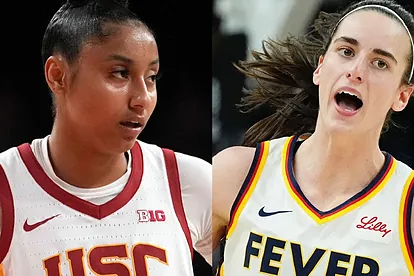Caitlin Clark has once again found herself at the center of controversy, not for anything malicious, but simply for showing support to an injured competitor. Clark’s well-meaning social media post regarding JuJu Watkins has triggered an outpouring of backlash, proving once more how divisive her presence has become in the world of basketball.

The entire situation began during March Madness when USC star JuJu Watkins suffered a severe injury while playing against Mississippi State. As expected, the basketball community rallied around Watkins, wishing her a speedy recovery. Among those offering support was Caitlin Clark, who posted a heartfelt message on her social media account: “Sending all my thoughts and prayers to JuJu. Kid will come back stronger than ever.” The message, accompanied by a simple red heart emoji, was meant to be nothing more than a show of encouragement from one athlete to another.
However, what should have been seen as a compassionate statement quickly spiraled into yet another reason for Clark’s critics to attack her. The backlash came swiftly, with people dissecting her word choice and accusing her of being condescending. The primary focus of the outrage? The word “kid.”
Social media users were quick to jump on Clark, with some arguing that calling Watkins a kid was inappropriate since there is only a three-year age difference between them. Others accused Clark of being dismissive or even subtly belittling Watkins. Some even took it a step further by injecting racial undertones into the conversation, claiming that the word was used in a way meant to diminish Watkins’ status as a player.

The sheer absurdity of the situation is mind-blowing. The term kid is commonly used in sports as an affectionate reference to young or up-and-coming athletes. Coaches, commentators, and even fellow players use it regularly without issue. It was never meant to be derogatory, yet Clark’s critics have once again twisted her words to fit their own narratives.
This incident is just another example of the level of scrutiny Clark faces in everything she does. If she had said nothing at all, the same critics would have likely accused her of being indifferent or unsupportive. Instead, she chose to express encouragement, only to have her words weaponized against her. It’s a no-win situation.
What makes this even more frustrating is that there’s been no indication that JuJu Watkins herself took any offense to Clark’s message. The supposed outrage is entirely manufactured by a select group of individuals who appear to be more interested in tearing Clark down than in genuinely supporting Watkins. Instead of focusing on Watkins’ recovery, they’ve hijacked the narrative to fit their own agenda.
This pattern of behavior is not new. Ever since Clark emerged as a dominant force in women’s basketball, she has faced relentless criticism. Whether it’s for her style of play, her media coverage, or even her mere presence, certain segments of the basketball community seem determined to vilify her. Many of the same people who claim to advocate for the growth of women’s basketball are the first to attack the very player who has brought unprecedented attention to the sport.
The reality is that Clark’s popularity represents a shift in the game, and not everyone is comfortable with that. Instead of celebrating the fact that both Caitlin Clark and JuJu Watkins are incredible young talents who can elevate women’s basketball to new heights, some individuals would rather manufacture controversy and perpetuate division.
At the end of the day, this entire situation is a distraction from what truly matters—Watkins’ health and recovery. Rather than tearing each other down, fans should be coming together to support all players who contribute to the sport. Clark’s message was meant to uplift, not offend, and it’s time for the basketball community to stop turning every word she says into a controversy.
